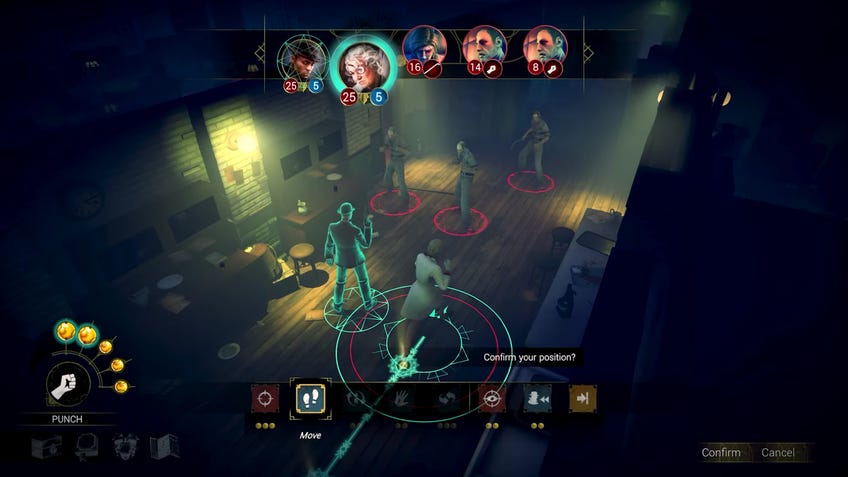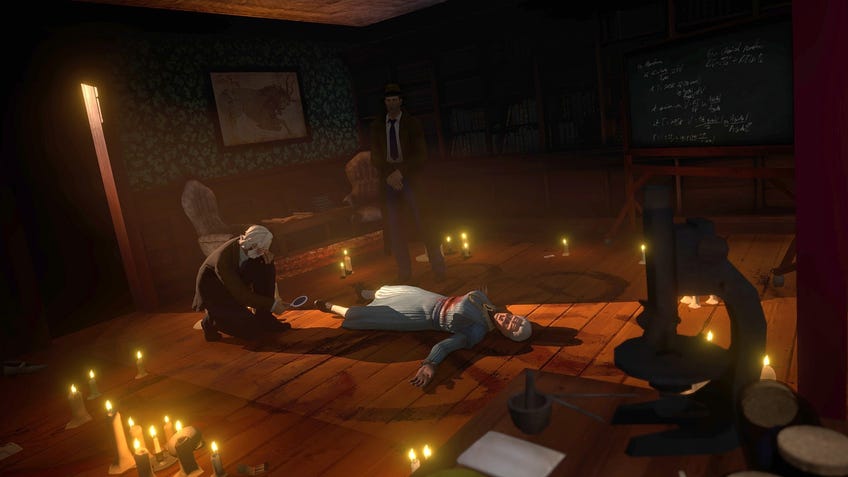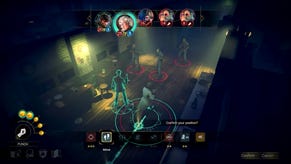Arkham Horror: Mother’s Embrace is a disappointing video game debut for the series
Clueless.
Arkham Horror has finally made its debut as a video game - and maybe it’s proof that it should’ve stuck to cardboard.
Arkham Horror: Mother’s Embrace will be familiar territory to anyone who’s ever braved horrors of the Arkham or Eldritch variety before. You form a band of investigators - series fans will recognise familiar faces from the Arkham Horror Files universe - head out to a location from in or around the Lovecraftian locale and proceed to pick up clues, retain as much of your mental resolve as you can and battle all manner of nightmare from beyond the stars.
Mother’s Embrace was originally announced under the banner of Mansions of Madness, and it’s the dungeon-crawler-turned-haunted house survival-horror game that it most closely resembles. Each level is a self-contained location - there’s the obligatory spooky mansion, Miskatonic University and disappointing tone-deaf psychiatric hospital, among others - that the investigators wander around, pulling open drawers, collecting fragments of foreboding notes and solving various puzzles. Exploration of the full 3D environments is done in real-time - if you can call the creakingly slow movement speed that. (The left trigger is presumably marked “Accelerate” by the control scheme because “Run” would be wildly overexaggerating.)
I’ve played a handful of levels and several hours on Nintendo Switch so far. While I can’t compare to the game’s presentation on the more powerful platforms of console and PC, running in the Switch’s handheld mode the performance is as sluggish as the characters on screen. While the Arkham Horror Files games have never been the most eye-catching of games on the tabletop, on screen the fuzzy assets pale in comparison to the crisp artwork borrowed from the physical cards.
William Yorick's endless stream of shoehorned Shakespeare references made me wish the end of the world would come a little sooner.
Encountering an enemy (which happens a few times each scenario) swaps the real-time exploration for a turn-based strategy game similar to the likes of XCOM. Investigators and enemies spend a limited number of action points to move, attack, cast spells and use items, with the ability to adopt an ‘overwatch’ stance to fire upon enemies during their turn. Combat is functional, if relatively dull - despite the importance of dice in the board games, the maths and rolls are hidden in the code, leading to a strangely detached feeling as you swing a cleaver wondering if you’ll land a crit. Even when you do, there’s little sense of satisfaction - whereas combat in the board games is often overly punishing, all of the battles I’ve encountered so far have been fairly easy to survive.
Exploration and combat alike are depicted with stiff animation - at points, the game swaps to a comic book-like series of still images - and flat voice acting, made worse by occasionally grating writing. My first character, dilettante Jenny Barnes, was a little lifeless, but I missed her innocuous asides desperately during a second run with gravedigger William Yorick, whose endless stream of shoehorned Shakespeare references made me wish the end of the world would come a little sooner.

The story itself concerns the mysterious death of a professor of astronomy, and its inevitable tie to cults, conspiracies and cosmic horrors. An original plot penned by some of the writers from Fantasy Flight Games - the publisher of the horror board games - so far it’s failed to engage with me on the level of any of the scenarios in Mansions of Madness, its various boxed expansions and DLC. At its best points, it’s a mundane horror story; at worst, it’s a series of harmful tropes about psychiatric patients. The Arkham Horror series - and Lovecraft board games as a whole - have always had a problematic relationship to their depiction of mental health and the use of “insanity” as a game mechanic, but those issues are laid especially bare here.
At its best points, the plot is a mundane horror story; at worst, it’s a series of harmful tropes.
Wider thematic problems aside, Mother’s Embrace simply lacks the gravitas and atmosphere of other Arkham Horror games. A Mythos clock ticks up during combat rounds and when characters make incorrect decisions while investigating. These choices often boil down to decisions such as “pick the lock” or “force it open”, with no indication of what’s considered “wrong” unless your investigator has the right trait. As far as I can tell, wrong answers are just wrong - it’s not a case of tougher odds on an invisible dice roll, which would’ve felt more faithful to the board game, and picking without any kind of insight feels like a frustrating game of chance too often. Despite the foreboding presence of the ever-ticking clock, however, Mythos events have little impact on each scenario, inflicting minor effects such as a slightly raised chance of failing sanity tests or faster weapon degradation.
This reflects the most disappointing aspect of Mother’s Embrace: there’s simply a lack of meaningful player agency. Unlike the tense time pressure of the board game as you race to save the world from impending doom, there are few penalties to investigating every clue and little variation in how scenarios play out with different characters, beyond some one-size-fits-all voice lines during conversations. While I’m yet to finish the game, there’s no indication that the story is affected in any way by my decisions or the outcome of individual scenarios. Mansions of Madness, Arkham Horror and Eldritch Horror make losing as fun and memorable as winning; so far, Mother’s Embrace feels like a game that’s only worth playing once (if that) - and will then be quickly forgotten.
Yet, despite all these gripes, I find myself strangely compelled to continue and see what becomes of it all - not my investigators or the mystery they unravel, but the game itself. Like so many Lovecraftian protagonists, maybe it’s the pursuit of seeing it for myself despite the knowledge that it can only end poorly. As someone who enjoys the Arkham Horror Files games despite their flaws, perhaps it’s the belief that there is a great video game to be made out of the series’ engaging characters, atmosphere and stories. Unfortunately, it’s just not this one.
Arkham Horror: Mother's Embrace is available now for PC, PS4, Xbox One and Nintendo Switch.






